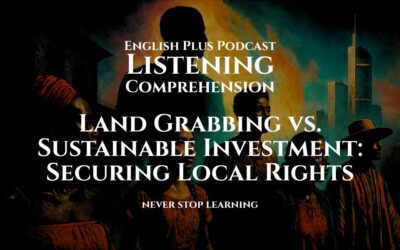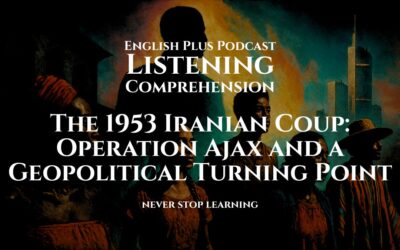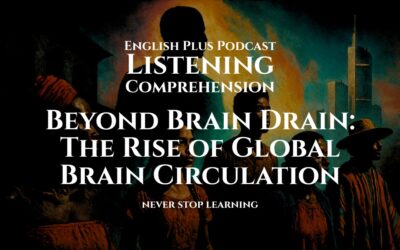Listen | History of the Olympic Games
Click to read the transcript of the lecture, but don’t do it before you listen if you want to improve your listening skills.
Let’s take a journey through time and explore one of the most iconic events in human history: the Olympic Games. When you think about the Olympics, what comes to mind? Athletes from all over the world competing for gold, the thrill of watching records being broken, or perhaps the opening ceremony that brings nations together in a spectacular display of unity. But how did it all start? How did a festival of sports become a global phenomenon that captivates millions every four years?
The story of the Olympic Games begins over two thousand years ago in ancient Greece, in a place called Olympia. Picture this: the year is 776 BC, and in the shadow of Mount Olympus, Greek men are preparing to compete in the first recorded Olympic Games. These early games were very different from what we see today. For starters, they were held in honor of Zeus, the king of the Greek gods, and only men could compete. In fact, it wasn’t just men competing—women weren’t even allowed to watch! The events were also a bit more, shall we say, raw. Instead of a long list of sports, the ancient Olympics focused on events like running, wrestling, and chariot racing. Athletes competed not for medals but for a simple wreath of olive leaves and, of course, the glory and pride of their city-state.
For over a thousand years, the Olympics continued in ancient Greece, becoming more than just an athletic competition. It was a cultural event that brought together people from different regions, even during times of war. That’s right—during the games, a truce was declared, and all conflicts were put on hold so athletes and spectators could travel safely to Olympia. It’s incredible to think that even in ancient times, sport had the power to unite people.
But like all good things, the ancient Olympics came to an end. Around the 4th century AD, under the Roman Empire, the games were banned, and the Olympic spirit lay dormant for more than a thousand years. Then, in the late 19th century, a Frenchman named Pierre de Coubertin had an idea. What if we brought the Olympics back? Not just for Greece, but for the whole world? And so, in 1896, the first modern Olympic Games were held in Athens, Greece. This time, it wasn’t just Greeks competing—athletes from 13 nations came to take part in this new global event.
From there, the Olympic Games grew. More sports were added, more nations participated, and by the time we reached the 20th century, the Olympics had become the international event we know today. One of the biggest milestones in Olympic history came in 1924 when the Winter Olympics were introduced, giving us iconic events like figure skating and skiing.
But the Olympics haven’t been without challenges. There have been boycotts, political tensions, and even times when the games were canceled, like during the two world wars. Yet, despite these setbacks, the Olympic Games have endured, symbolizing not just athletic excellence, but peace, unity, and human resilience. The Olympics have seen some unforgettable moments too—who can forget the incredible feats of athletes like Usain Bolt or Michael Phelps? Their achievements have inspired people all over the world, reminding us of what humans can accomplish when they push themselves to the limit.
One of the things that makes the Olympics so special is the way it brings the world together. Every four years, we set aside our differences and gather to celebrate what unites us: our love of sport and competition. It’s not just about winning medals; it’s about showing the world that, despite our different languages, cultures, and backgrounds, we are all part of the same global family.
So, as we look to the future, what do you think the Olympic Games will look like? Will we see new sports added? Will we one day have an Olympics on the moon? Who knows? But one thing’s for sure—the Olympic Games will continue to inspire and unite people for generations to come.
Comprehension Quiz
Expand Your Vocabulary
- Phenomenon
A phenomenon is something that can be observed, often something remarkable or impressive. In the lecture, the Olympic Games are described as a global phenomenon. In everyday use, you might say, “The rise of social media is a fascinating phenomenon that has changed the way we communicate.” - Iconic
Iconic refers to something that is widely recognized and represents a certain ideal or symbol. The Olympic Games are iconic because they represent global unity and athletic excellence. You could also say, “The Eiffel Tower is an iconic symbol of Paris.” - Resilience
Resilience is the ability to recover quickly from difficulties. In the context of the Olympics, it refers to how the games have endured despite challenges like wars and political tensions. You might use it in everyday life by saying, “She showed great resilience after losing her job by quickly finding new opportunities.” - Truce
A truce is an agreement between opposing parties to stop fighting for a certain period of time. In the lecture, a truce was declared during the ancient Olympic Games. In everyday English, you could say, “We decided to call a truce and stop arguing for the rest of the night.” - Cultural
Cultural refers to anything related to the ideas, customs, and social behavior of a society. The ancient Olympics were not just athletic events but also cultural gatherings. In daily conversation, you could say, “Attending a local festival is a great way to experience cultural traditions.” - Boycotts
A boycott is a refusal to participate in something as a protest. The lecture mentions Olympic boycotts that occurred due to political tensions. In another context, you might say, “Many people decided to boycott the store after it was revealed they treated their employees unfairly.” - Milestone
A milestone is a significant event or stage in development. In the lecture, the introduction of the Winter Olympics in 1924 is described as a major milestone. In everyday use, you might hear, “Graduating from college is an important milestone in a person’s life.” - Feats
Feats are extraordinary achievements that require great skill, strength, or courage. Athletes like Usain Bolt and Michael Phelps are celebrated for their incredible feats in the Olympic Games. You could also say, “Climbing Mount Everest is an impressive feat of endurance and strength.” - Athlete
An athlete is someone who competes in sports or physical activities. In the context of the Olympics, athletes from all over the world gather to compete. In everyday conversation, you could say, “He’s a talented athlete who excels at both soccer and basketball.” - Unity
Unity means the state of being joined together or working as one. The lecture emphasizes how the Olympics bring nations together in unity. In other contexts, you might say, “The community showed great unity in helping those affected by the hurricane.”
Vocabulary Quiz
Let’s Talk
- The Olympic Games are described as a phenomenon that brings the world together. In your opinion, why do sports have such a unifying effect on people from different cultures and backgrounds?
- The lecture mentions that during the ancient Olympic Games, a truce was declared to ensure safe travel. Do you think sports today still have the power to ease political or social tensions? Why or why not?
- Athletes like Usain Bolt and Michael Phelps are celebrated for their extraordinary feats in the Olympics. What do you think motivates these athletes to push themselves to such extremes? Can the same motivation apply to non-athletic achievements?
- The lecture discusses how the Olympic Games have survived wars, boycotts, and political challenges. What other global events or institutions do you think show the same level of resilience?
- In ancient times, women weren’t allowed to compete or even watch the Olympic Games. How do you think the inclusion of women in the modern Olympics has changed the dynamics and significance of the event?
- The lecture highlights how the Olympics symbolize unity. What are other ways, besides sports, that people from different countries and cultures can come together to promote unity?
- As the Olympic Games continue to evolve, new sports and events are being introduced. What new sports would you like to see included in future Olympics, and why?
These questions are designed to encourage deeper thinking about the role of the Olympic Games in society, how they reflect human resilience, and the power of unity through sports. Feel free to share your thoughts in the comments or discuss them with friends and family!










0 Comments